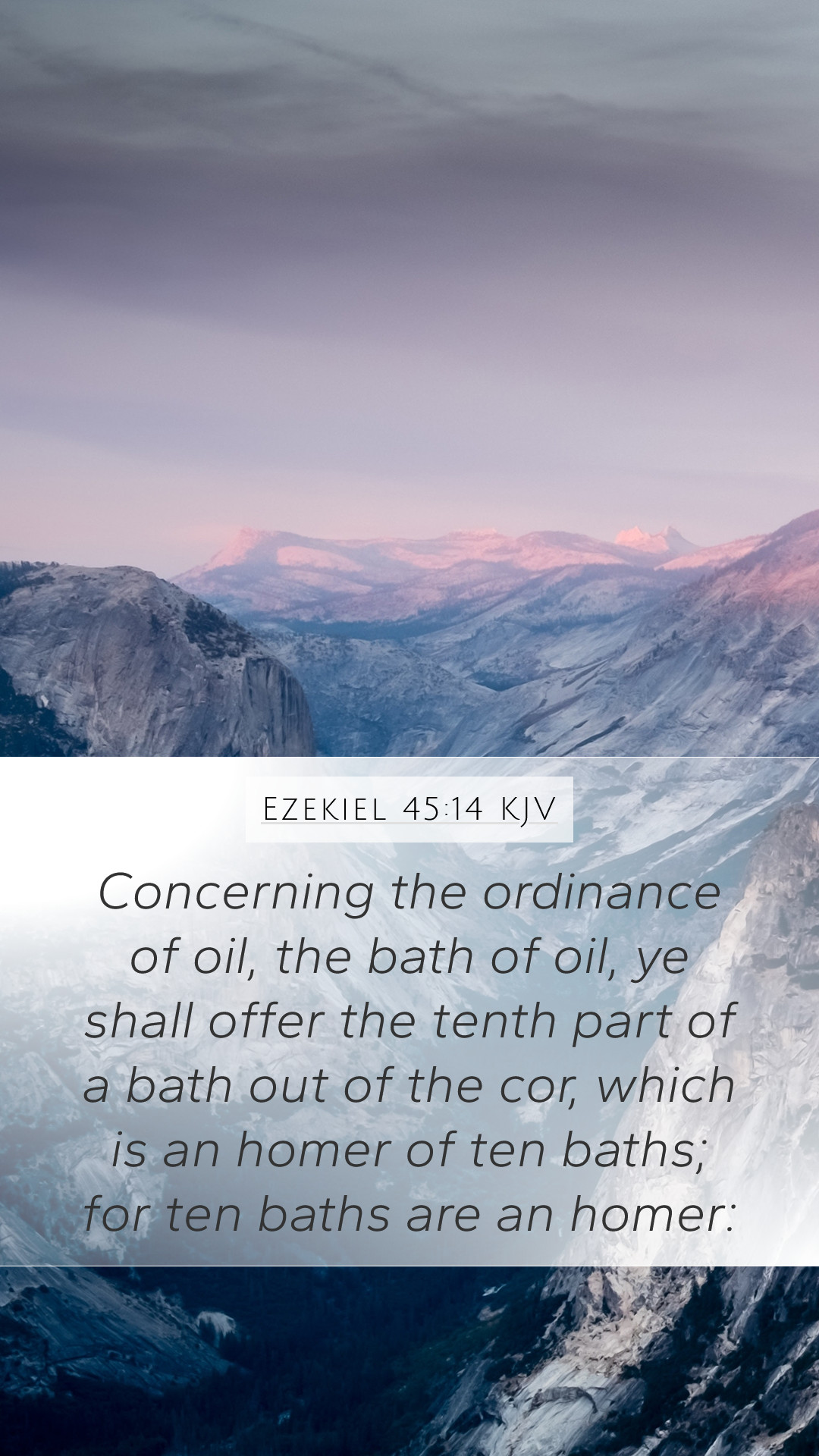Ezekiel 45:14 - Bible Verse Meaning and Interpretation
This passage from Ezekiel is pivotal in understanding the distribution and significance of offerings in the context of worship and governance in ancient Israel. Here, Ezekiel outlines specific measures for the offerings of oil, which highlights both the physical and spiritual dimensions of Israel's relationship with God.
Verse Text
Ezekiel 45:14 (KJV): "And of the flooded measure shall you measure the oil, the tenth part of a hin: the oil shall be holy unto the Lord."
Verse Explanation
This verse serves as part of Ezekiel’s vision concerning the temple and the regulations for worship. Here’s a detailed breakdown of its meaning:
- Measurement of Oil: The stipulation of measuring the oil in a 'tenth part of a hin' points towards the precision required in offerings. Matthew Henry emphasizes that such measurements symbolize the meticulous attention God desires in our offerings, reflecting the holiness of the act.
- Holiness of Offerings: The phrase "holy unto the Lord" underscores that the offerings, meant for worship, should be set apart, indicating the reverence owed to God in every act of giving. Albert Barnes expounds that this holiness denotes that the oil is not just any commodity but dedicated for sacred use, integral to communion with God.
- Symbolic Significance: The oil often symbolizes the Holy Spirit and anointing in biblical tradition. Adam Clarke notes this prophetic symbolism evokes the need for spiritual filling and empowerment, signifying a heart and worship aligned with divine intent.
- Covenant Relationship: The regulated offerings reflect Israel's covenant relationship with God, whereby offerings are not merely rituals but a declaration of loyalty and dependence upon the Lord. Bible study insights highlight that such acts of worship are foundational in communal identity and divine favor.
Contextual Understanding
In the book of Ezekiel, particularly in chapters 40-48, we find detailed instructions regarding the temple's structure and the responsibilities of the priests. This meticulous detail serves a dual purpose of instruction and reassurance of God’s commitment to His people. Understanding this chapter requires an appreciation of:
- Historical Context: Ezekiel was written during the Babylonian exile, a time when the Jewish people longed for their homeland and worship practices. The prescriptions in Ezekiel serve to remind them of their heritage and future restoration.
- Spiritual Significance: Offerings such as oil are not merely about material gifts but also encompass the heart’s posture towards God, aligning with themes of sacrifice and surrender found throughout Scripture.
Application for Today
The teachings in Ezekiel 45:14 hold enduring lessons for modern believers:
- Spirit of Generosity: In our acts of giving, reflecting the right intention and heart posture is crucial. Bible verse interpretations from recent studies encourage Christian communities to generously support the work of God in their midst.
- Cultivating Holiness: Similar to the oil’s designation as holy, we are called to approach our offerings—whether resources, time, or talents—with reverence and recognition of their spiritual significance.
- Discernment in Worship: Understanding the prescribed measures and portions can lead to deeper Bible study lessons emphasizing the balance between generosity and wisdom in our stewardship of God’s blessings.
Cross References
This verse connects with several key scriptures that expand its meaning:
- Exodus 30:24-25: Instructions on making holy anointing oil.
- Leviticus 2:1: The grain offering and its significance.
- 1 John 2:20-27: The anointing of the Holy Spirit in believers' lives.
Conclusion
In conclusion, Ezekiel 45:14 embodies vital principles that bridge the ancient texts with contemporary faith. Through scriptural analysis, we see the importance of intentional worship and the holistic representation of our faith in both practice and devotion.
This verse invites believers to engage in deeper Bible study insights that enhance our understanding of Scripture and its application in daily life, aligning with the rich tradition of biblical exegesis fundamental to our faith practice.


